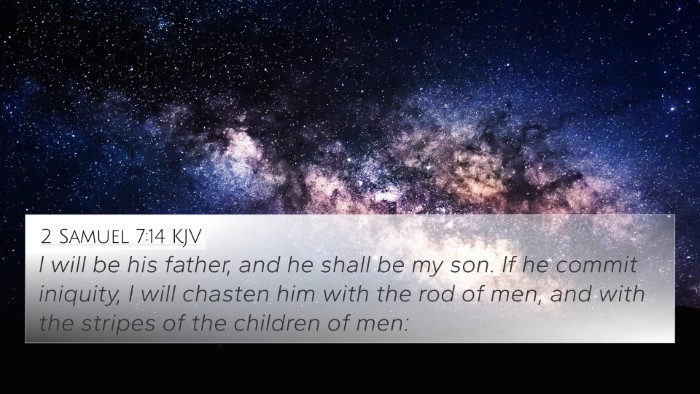Understanding Hebrews 12:6
Hebrews 12:6 states: "For whom the Lord loves He chastens, and scourges every son whom He receives." This verse emphasizes God's love manifesting through discipline, a theme echoed throughout Scripture.
Overview of Biblical Discipline
Discipline in a biblical sense is more than mere punishment; it is a reflection of God's loving commitment to our spiritual growth. This verse invites us to consider the purpose behind God's corrections – they are indicative of His fatherly relationship with us.
Commentary Insights
Matthew Henry’s Commentary
Henry emphasizes that God’s correction is a sign of His love and acceptance. He explains that just as earthly fathers discipline their children to guide them, God, too, guides His children towards righteousness through His spiritual rebukes.
Albert Barnes’ Notes
Barnes points out that God's chastening is necessary for our spiritual development. He connects this with the notion that suffering leads to a greater yield of peace and righteousness (as noted in Hebrews 12:11). Barnes also notes that the suffering does not mean God has abandoned us, but rather He is preparing us for greater things.
Adam Clarke’s Commentary
Clarke elaborates on the theme of divine sonship and emphasizes that refusal to accept God's discipline equates to rejecting our status as His children. He compares God's relationship with believers to a human father's love for his own, which entails both tenderness and discipline.
Thematic Connections
This verse can be cross-referenced with several other Biblical texts that delve into the themes of love, discipline, and sonship:
- Proverbs 3:11-12: "My son, do not despise the Lord’s discipline, and do not resent His rebuke, because the Lord disciplines those He loves, as a father the son he delights in."
- Revelation 3:19: "Those whom I love, I rebuke and discipline. So be earnest and repent."
- Psalms 94:12: "Blessed is the man you discipline, Lord, the man you teach from your law."
- James 1:2-4: "Consider it pure joy, my brothers and sisters, whenever you face trials of many kinds, because you know that the testing of your faith produces perseverance."
- Romans 8:17: "Now if we are children, then we are heirs—heirs of God and co-heirs with Christ, if indeed we share in His sufferings, in order that we may also share in His glory."
- 1 Peter 4:12-13: "Dear friends, do not be surprised at the fiery ordeal that has come on you to test you, as though something strange were happening to you. But rejoice inasmuch as you participate in the sufferings of Christ..."
- Job 5:17: "Blessed is the one whom God corrects; so do not despise the discipline of the Almighty."
Conclusion
This analysis of Hebrews 12:6 through the perspectives of esteemed biblical commentators provides profound insights into God's discipline. Understanding the nature of God's chastening leads to a deeper appreciation of His love and commitment to our growth, ultimately intertwining the connections between Bible verses on discipline and love.
Further Study and Cross-Referencing
For those seeking to deepen their understanding of God's disciplinary nature and His love for us, exploring the cross-references provided can yield rich insights into the overarching narrative of the Bible, reinforcing the interconnectedness of its teachings. Utilizing Bible cross-reference tools and Bible concordances can significantly aid in this study.
As one delves into these scriptures, it is worth noting that the principles of divine chastisement and grace are repeated in various contexts throughout the Scriptures, demonstrating a consistent theme of God's fatherly role.


















